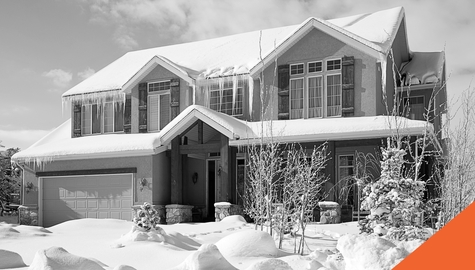How to Choose Your Canadian Mortgage Rate
Tuesday, 21 February 2023
When it comes to purchasing a home, understanding your mortgage and the implications of fixed versus variable rates is absolutely essential. As a home buyer, knowing the difference between these two types of mortgage rates can help you make an informed decision when it comes to financing your purchase. Homebuyers have a critical choice to make when it comes to securing their mortgage; should they go for the stability of a fixed-rate, or opt for potential savings with a variable option? It's an important decision that could greatly impact your financial future.
Fixed Mortgage Rates
What is it?
A fixed rate mortgage is one in which the interest rate remains unchanged for the duration of the loan. This means that you can plan ahead knowing exactly what your monthly payments will be for the life of your loan.
Advantages
The advantage of a fixed rate mortgage is that it offers predictability and consistency. Home owners know exactly what they are paying each month and can plan accordingly
Disadvantages
The downside is that if market conditions cause interest rates to drop significantly, then a fixed-rate mortgage won’t take advantage of those lower rates until renewal time.
Variable Mortgage Rates
What is it?
A variable rate mortgage, on the other hand, is one in which the interest rate may fluctuate depending on market conditions. This type of mortgage may offer lower interest rates than a fixed-rate mortgage initially, but this lower rate is not guaranteed and could increase at any time without warning.
Advantages
An advantage of a variable mortgage rate is that a homeowner has exposure to lower interest rates meaning that they will pay less when rates dip.
Disadvantages
When interest rates go up though, homeowners with a variable rate will end up paying more and their monthly interest payments will increase.
How to Choose Your Mortgage Rate
When deciding between a variable or fixed mortgage rate, the spread represents how much you're paying for security in case interest rates rise. If interest rates are low and not expected to drop further, it's best to lock into a fixed rate since variables could stay stagnant at worst, but won't take advantage of any potential decreases. However, if there is confidence that rates will go down soon, then choosing a variable rate gives you an opportunity to capture those savings with lower payments. Buyers need to analyze whether locking-in offers enough assurance from increasing costs beyond what may be lost by foregoing possible drops in interests when selecting the former option.
Homeowners will want to consider other factors like taxes and fees associated with mortgages as well as any prepayment privileges that come with them (i.e., allowing you to pay more than your required payment each month).
Popularity of Fixed vs Variable Mortgage Rates
Fixed and variable mortgage rates are often compared with multiple benefits and disadvantages for both. However, in 2021 it seemed the variable mortgage rates held a clear advantage! Variable-rate mortgages saw an incredible surge in popularity thanks to their seemingly unbeatable interest prices. According to CMHC data, over half of all new mortgages and renewals ended up being variable rate - with 33% of all Canadian loans fitting this category by 2022. Unfortunately for those who opted for variables it meant that these once attractive terms weren't quite so desirable anymore.
How the Bank of Canada Adjusts Mortgage Rates
The Bank of Canada has released the interest rate announcement schedule for 2023. Prime rates are adjusted based on periods of deflation—when the value of the dollar increases and the price of goods and services fall—or inflation—when the value of the dollar decreases and the cost of goods and services rises. The adjustment of prime interest rates on loans by central banks is known as monetary policy, not to be confused with fiscal policy (where a government raises or lowers taxation rates to adjust the money supply) and is enacted to either raise or lower the amount of circulating dollars within a mixed economy’s money supply.
The Fed raising an interest rate is referred to as hawkish behaviour, and the lowering of an interest rate is referred to as doveish behaviour. When interest rates are increased, reflation, which refers to a return to a previous rate of inflation, occurs as the value of the dollar rises because there is less money in circulation; people are spending less to save towards their increased loan payments. When interest rates are decreased, the rate of inflation rises as there are more dollars in circulation; people have more money to spend because of cheaper loan payments. In general, a rapid reduction or increase in interest rates can lead to hyperinflation or even rarer periods of hyperdeflation.
Either phenomenon can cause massive levels of unemployment. During periods of hyperinflation, companies undergo huge layoffs to reduce expenses as the cost of manufacturing and production rises because of how rapidly the purchasing power of the dollar declines. During periods of hyperdeflation, companies reduce production because people are not spending money due to the value it is accruing by saving it. As the demand for goods and services falls, companies then layoff employees to match their slowed production output. Hyperdeflation is incredibly dangerous due to how manufacturing can just halt which results in a shortage of available products for purchase.
Fixed vs Variable Rate Overview
- Variable rates offer lower initial costs and potentially some savings if interest rates drop, but borrowers are at risk of their payments increasing over time.
- Fixed-rate mortgages provide stability through consistent monthly payments for your entire term - an especially important benefit in today's uncertain economic climate
- Fixed mortgages come with higher prepayment penalties and slightly higher upfront costs than variable-rates do
- Some lenders let you convert a variable-rate mortgage to a fixed rate, or even combine a fixed rate and a variable rate into a hybrid mortgage.
When looking for a new home loan, it's essential to understand both fixed and variable mortgage rates so that you can make an informed decision about which option works best for your needs. With some careful consideration and research into taxes and fees associated with loans as well as any prepayment privileges available, homeowners can take advantage of either option while keeping their finances secure.
If you are also purchasing a new home or making significant renovations, contact a BIG broker today. It’s our goal at Billyard Insurance Group to protect what you value most while providing the most affordable price without compromising coverage. Your home is one of your most valuable assets, and you deserve to have peace of mind knowing that BIG insurance has you covered. Let our brokers work on your behalf, assess your needs, and provide recommendations catered to your situation.



